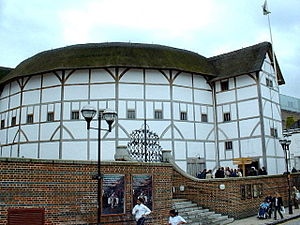Read the brief facts of the burning of Shakespeare’s Globe Theatre, and the sassy poems which followed.
“All This Is True…”
On this day in 1613 fire destroyed the Globe playhouse, where Shakespeare was both playwright and part owner. The fire started during a performance of his Henry the Eighth: sparks from a cannon set off to announce the King’s Act I entrance ignited the thatched roof, destroying the building in an hour. There are a number of contemporary descriptions of the event, two of them in poems licensed at the Stationers’ Register the very next day. Both of the poems are of uncertain authorship; they may have been written by playhouse-hating Puritans, but as competition for the entertainment shilling was fierce in Elizabethan England, the cheeky “Sonnett upon the pittiful burneinge of the Globe playhowse in London” may have been the jest of an owner of one of the rival open-air theaters. Part of the joke in the poem is based on the refrain “all this is true,” which is an alternative title for Shakespeare’s play:
…No shower his raine did there downe force
In all that Sunn-shine weather,
To save that great renowned howse;
Nor thou, O ale-howse, neither.
Had itt begunne belowe, sans doubte,
Their wives [i.e. of the owners] for feare had pissed itt out.
Oh sorrow, pittifull sorrow, and yett all this is true.
Bee warned, yow stage strutters all,
Least yow againe be catched,
And such a burneing doe befall,
As to them whose howse was thatched;
Forbeare your whoreing, breeding biles,
And laye up that expence for tiles.
Oh sorrow, pittifull sorrow, and yett all this is true….
London’s current, open-air Globe playhouse was constructed 200 yards from the 1613 Globe, and is as close in design and materials as scholars and building codes could manage: the thatch is of Norfolk reed, the beams are of green oak, and the plaster is of the Elizabethan sand-lime-hair recipe (though goat hair is now used, the hair of the modern British cow having been jidged too short).

